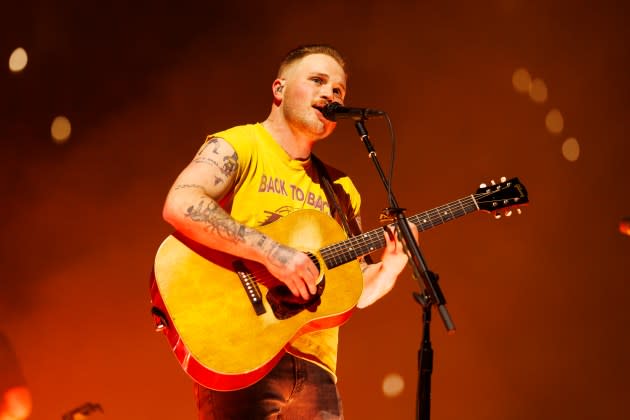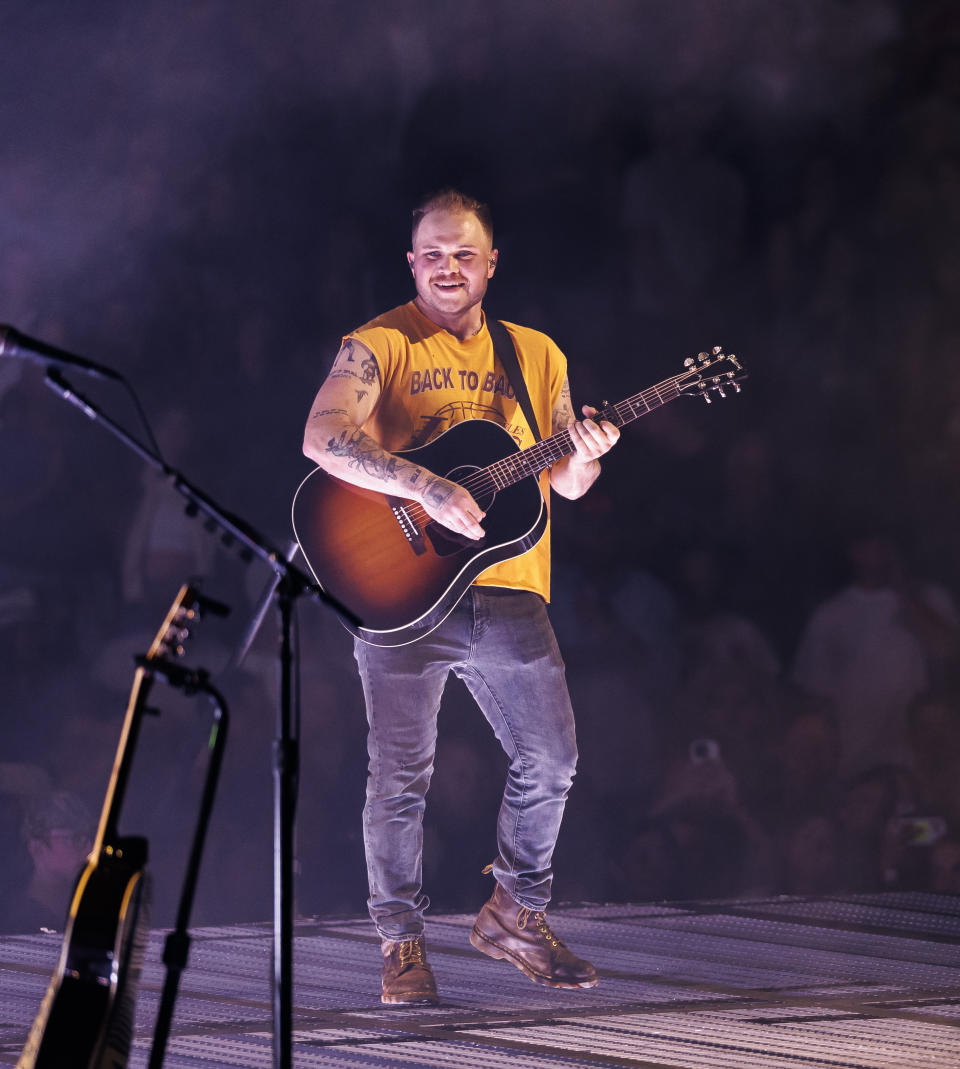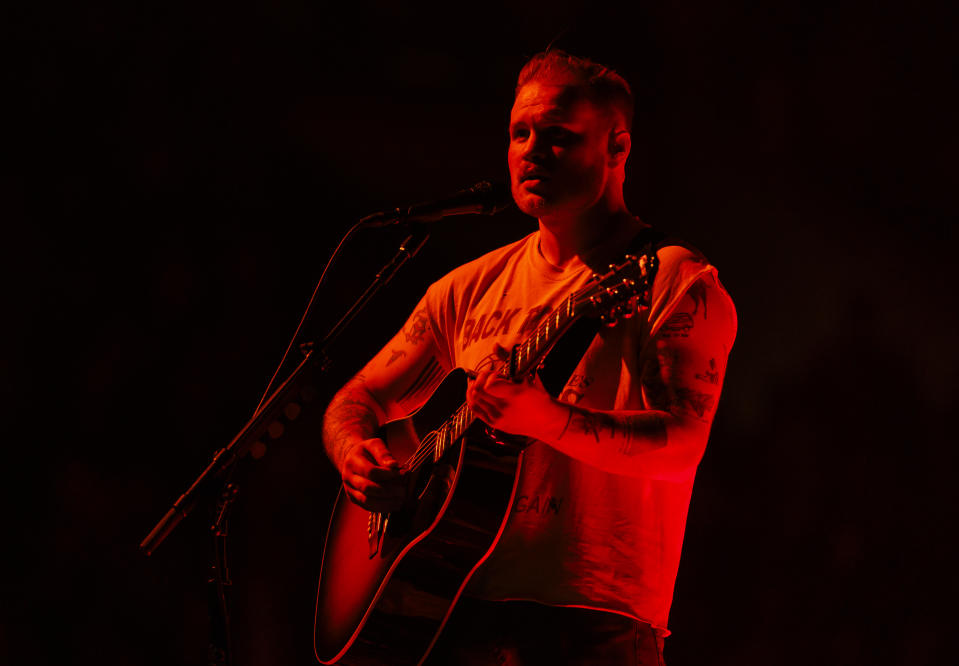Zach Bryan Brings ‘Pink Skies’ and Red-Hot Fervor to an L.A. Arena Three-Night Stand: Concert Review

Can a song about a funeral be a valid candidate for the annual Song of the Summer sweepstakes? Maybe the subject matter should make it an automatic disqualifier, for what we think of when we imagine the picks for that title. And yet if there’s anything that can be said that applies across the board in the career of Zach Bryan, it’s that standard rules don’t apply. And they certainly don’t apply to “Pink Skies,” the song that he released in late May as the first single from an upcoming album. So if a superstar as seemingly unstoppable as Bryan wants to usher in the summer with a ballad about family members coming together for a memorial service, who’s to say that shouldn’t be considered a banger, of sorts, alongside “Espresso” or “Lunch”? Even with close to zero radio play, “Pink Skies” currently stands in the top 10 of both the Billboard Hot 100 and the Spotify 50, and given the rabidity of his fan base, it could remain there for a while. It’s the feel-grievous hit of the summer.
Bryan played “Pink Skies” live for the second time ever Sunday night at L.A.’s Crypto.com Arena, where he and his band were playing the first show of a three-night stand, for which almost all of the 20,000 available tickets per night were sold out. He flubbed the first verse, which became the light-hearted occasion for him to mention just how new to his setlist it was. (He’d given the song its live debut two nights earlier, at the Oakland Coliseum, in front of a crowd of about 60,000.) Even before he joked around about messing it up, the song was destined not to come off as, well, funereal. Nothing in a Bryan concert, even any of his most sadcore songs, really comes off as anything less than rousingly anthemic when a crowd is determined to shout along with every word, and the highly animated performer on stage has no intention of letting any inherent melancholia in his own material bring the mood down.
More from Variety
There’s precedent for how “Pink Skies” was received, anyway. Take a slightly older song that popped up in the set, “East Side of Sorrow” (from his self-titled 2023 album). That one also has to do with a death in the family, one that feels a bit more autobiographical for Bryan, as he sings, “I lost you in a waiting room… You were the last thing I had that was good… 6 a.m. and fucked up again / Askin’ God where the hell he’d been.” The mood of the crowd while these wrenching lyrics were being performed? Nothing short of Singalong City, naturally.
Bryan makes it awfully difficult to be in a solemn mood at one of his shows, in short — his penchant for rowdy showmanship ensures that. But there’s another reason to be in a good mood, watching him play: It’s from realizing afresh just how wildly successful he has become by throwing out any playbook that exists for how to get there. His radio play is nearly non-existent… deliberately so, probably, since last week he was sending out complaining tweets when he thought his record label was actively promoting “Pink Skies” to pop radio. (He apologized when it turned out he was mistaken.) He doesn’t do television appearances or interviews. He’s never even had a flashpoint viral moment. It’s just relatable songs, rousingly performed with the spirit of an Okie-fied Springsteen or Mellencamp. This genre-unspecific music is largely being received by a segment of the mainstream country audience that’s been ditching the party anthems of that other big heartland Bryan — Luke — for this one’s more poetic fare.
And he has fantastic taste in collaborators/opening acts. Sunday and Monday is was the War and Treaty invited to Crypto to recreate a duet from his last album, “Hey Driver,” with Sierra Ferrell set to assume the same spot Tuesday night. Even if you don’t love the songs, it’d be difficult to see anything other than sheer upside in how his massive success has gone down.

But there is a lot to love about the songs, too, and not just his ornery-populist methodology. At Crypto, a lot of the two-hour running time was devoted to taking songs that are deeply interior on record and turning them into barnburners, in subtle shifts that didn’t compromise the material’s integrity. His self-titled album from last summer marked a somewhat surprising turn toward quirky, lo-fi production values, but the five songs Bryan played from that album in concert didn’t sound much different from the six he performed from 2022’s more overtly commercial “American Heartbreak.” Starting the show with the ostensibly contemplative “Overtime,” Bryan managed to turn it into more of an obvious live blockbuster just by bellowing the title word instead of murmuring it, at the end of every stanza — the kind of small shift that can make a big difference in a performance. But when it came time to end the song, he toned it down again. Bryan isn’t afraid to wrap up a tune on a hushed note, even finishing songs with an unresolved-sounding a cappella coda now and again, in an arena show that is also duty-bound to deliver a fair amount of bluster.
A blitheness of spirit was evident in Bryan’s choice of a running joke. “I hope you guys don’t hate it,” Bryan said in introducing the third song of the show, “God Speed,” a fan favorite that was clearly not in danger of not going over. “Hope you guys don’t hate it,” he repeated in introducing “Oklahoma City,” a few numbers later. Altogether he reiterated a variation on this phrase at least a half-dozen times, for reasons unknown, other than amusing himself or his band. It might’ve come off as a parody of stage humility, except that Bryan did take pains to establish in more earnest terms that he doesn’t take his good fortune in selling out arena multi-nighters for granted. Flattery would get him everywhere — “I don’t want to say this because I could be canceled online, but this is the loudest crowd we’ve had all year,” he said, and maybe he doesn’t say that to all the girls.

These songs were equal parts country, Western (not to confuse, conflate or hyphenate those two), folk, rock, and the folk-rock hybrid formerly known as stomp-and-holler. Steel guitar and lap steel (albeit not on a lap, but played in a standing position) became increasingly utilized over the course of the set, but played with more of a rock feel than anything tying them to traditional Nashville. Bryan noted that his usual violin player was absent on paternity leave, which gave a chance for a guest fiddler, Hannah Cohen, to shine in the spotlight and happily disrupt the otherwise all-male lineup. Utility player Read Connelly gets the biggest recurring comic moment of the night, during the show’s inevitable climax, “Revival,” during which he falls to the stage floor and plays dead for a pregnant pause, only to snap back to life — revival, get it? — and, from a crouch, burn through the night’s first and last major banjo solo.
The show found Bryan in a similar position to where he was when he came through Crypto.com last year for a single-nighter: about to release an album, and not about to give away too much about it. Other than “Pink Skies,” the only number he performed to preview the next record was its apparent title song, “The Great American Bar Scene.” (As wtih “Oklahoma Smokeshow,” he changed the location in the title to “California,” so that the cutoff Lakers jersey he was wearing wasn’t the only sop to local culture.) That’s more than he played from a forthcoming album last year, when he didn’t preview any of the songs from “Zach Bryan” even though that album release was days away at the time. It’s unclear when “Great American Bar Scene” might be coming out: In a recent tweet, Bryan made it sound as if he might imminently, spontaneously release it, but on stage, he said only that the album is forthcoming “this year,” which leaves a lot of wiggle room. Whenever he does opt to drop it, it could be the album to finally dislodge Taylor Swift from the top spot; there probably aren’t enough variants in the world to keep Bryan from taking an appointed spot at No. 1. But with a shortage of live previews, fans will have to keep guessing whether the album will be as interior as the self-titled effort or as anthemic as “American Heartbreak.”
This year’s “Quittin’ Time” tour takes place in the same format as last year’s “Burn Burn Burn” tour: in the round. (Except for the intermittent stadium shows, where he has to play in a more traditional setup.) Only “in the round” is really a misnomer for the unique approach Bryan takes — it’s really in the square. While most performers who play in the center of an arena might have a wireless mic that allows them to freely roam, Bryan has a microphone stand set up on all four sides of his stage, and he hits all four of them in nearly every one of the 24 songs in the set. (Nobody gets this many steps in anywhere this side of the endlessly walking villain in the new slasher movie “In a Violent Nature.”) It’s obviously an egalitarian move: all four quadrants of a massive arena get directly played to at some point in every number. So, in its fashion, this is almost as choreographed as a Taylor Swift show, except that it involves musicians constantly shifting to hit different marks all night. (If you’re wondering if at least the drummer is anchored all night… no, he plays two different kits, facing in opposite directions.) The crowd goes with this, obviously, and can look up at the overhead big screens when Bryan is on the opposite side of the stage. For anyone prone to touches of OCD, it can be distracting, keeping constant track of where the frontman is on stage at any given time — and thinking about the little pauses that are built into the arrangements sometimes, to let him get from one mic to another between a chorus and a verse. Closing your eyes for a minute can be the cure to snap you out of that. In any case, it’s interesting to see Bryan keep this experiment going — and perhaps adopt it for good — even as it seems unlikely many other performers will leap to follow in his exact footsteps.
The presence of the husband-and-wife duo the War and Treaty as a galvanizing opening act of course bid well for a sure highlight in the headliner’s set: a revival of Bryan’s duet with Michael Trotter on “Hey Driver,” possibly the best song off last year’s self-titled album. Bryan apologized for all the “shitty” versions he and his band had done of the song on tour to date without the Trotters, before launching into a new vocal arrangement that, unlike the record, made room for Michael’s wife Tanya, and three-part harmony instead of two-. An additional, humble solution on Bryan’s part was just to hand over to Tanya some of the lead vocal lines he handled in the studio. The War and Treaty have been doing their own cover of the song out on tour (including two performances at Stagecoach), but getting to hear this blend of voices was a treat you’d wish could be handed down to all the audiences along Bryan’s tour routing this year, and not just a selected few.
Bryan and his band made their way backstage through a path cut through the audience, then returned through the same open tunnel, bringing in tow some of the backstage VIPs — Tate McRae, Casey Affleck and various local sports figures among them — for the traditional jump-around “all-night revival” finale to his show. It’s a churchy way to go out, but after a lot of down-and-out sketches dressed up as rabble-rousers throughout the preceding two hours, it didn’t hurt to finally revert to pure Pentecostalism on the edge of the show’s actual quitting time.
Best of Variety
Sign up for Variety’s Newsletter. For the latest news, follow us on Facebook, Twitter, and Instagram.


